|
|
|
Sort Order |
|
|
|
Items / Page
|
|
|
|
|
|
|
| Srl | Item |
| 1 |
ID:
082623
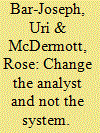

|
|
|
|
|
| Publication |
2008.
|
| Summary/Abstract |
Recent intelligence failures, including first and foremost the mistaken estimate of Iraq's weapons of mass destruction (WMD) prior to the war, show that a prime source of such failures is the adherence by analysts to preconceptions (or mind-sets) which entail the rejection of new information that contradicts it. The source of this kind of problem lies in well known psychological mechanisms. Yet official investigations into intelligence blunders have typically ignored this problem or have not suggested an appropriate solution thus far. Our paper suggests an original approach based on the fact that certain types of personalities are more likely than others to fall victim to these biased judgments. Existing psychological tests can help determine individual susceptibility to such tendencies. Therefore we suggest that intelligence organizations should pay far more attention to these personality characteristics, especially an analyst's level of openness, in recruitment, training, and promotion. Such attention would help create more effective reforms in intelligence than organizational models which advocate "devil's advocate" kind of solutions.
|
|
|
|
|
|
|
|
|
|
|
|
|
|
|
|
| 2 |
ID:
090710
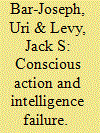

|
|
|
|
|
| Publication |
2009.
|
| Summary/Abstract |
Uri Bar-Joseph and Jack S. Levy look at the different ways in which the conscious distortion of information and the politicization of intelligence can lead to intelligence failure. They apply their categories to the Soviet failure to anticipate the German attack in 1941 and to the Israeli failure to anticipate the Arab attack in 1973.
|
|
|
|
|
|
|
|
|
|
|
|
|
|
|
|
| 3 |
ID:
124174
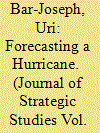

|
|
|
|
|
| Publication |
2013.
|
| Summary/Abstract |
The surprising 'Arab Spring' raises the question as to what would enable national intelligence to provide high quality warnings prior to the eruption of popular revolutions. This article uses new sources of evidence to trace and explain Israel's success in comparison to US failure at correctly estimating the course of the Iranian Revolution in 1977-79. In explaining this variance, the article shows that it was mainly the result of the intimate acquaintance of Israel's representatives in Iran with the local language, history and culture, as well as the ability to communicate with locals - tools which the Americans completely lacked.
|
|
|
|
|
|
|
|
|
|
|
|
|
|
|
|
| 4 |
ID:
081905
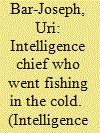

|
|
|
|
|
| Publication |
2008.
|
| Summary/Abstract |
In March 2007, following arbitration between Israel's director of Military Intelligence in the Yom Kippur War, Maj. Gen. Eli Zeira and the Mossad chief in 1973, Zvi Zamir, it was officially ruled out that Zeira leaked the identity of Israel's most important source in Egypt to unauthorized journalists. The agent, Dr Ashraf Marwan, Nasser's son-in-law and Sadat's close advisor, had since 1969 given the Mossad excellent information about Egypt's war preparations. He was also the source for the warning that ultimately geared Israel to war a few hours before it started on 6 October 1973. This article describes the process through which, from the early 1990s, Zeira leaked to unauthorized students of the Yom Kippur War information concerning the identity of the source and hypothesizes about what could have motivated him to take this action
|
|
|
|
|
|
|
|
|
|
|
|
|
|
|
|
| 5 |
ID:
094815


|
|
|
|
|
| Publication |
2010.
|
| Summary/Abstract |
Although Israel constitutes an interesting case for the study of civil-military relations, the role played by its Directory of Military Intelligence (AMAN) has rarely been discussed in this context. This role is of special interest, since Israel is the only liberal democracy today in which a military intelligence service functions as the leading national estimator not only in military but also in civilian affairs. The unique Israeli model is usually justified by Israel's security concerns-primarily the threat of a sudden conventional attack. To test this model's validity, this article (1) traces and elucidates its historical development; (2) employs five crucial mini case studies to test its practical success or failure; and (3) explains how, in light of the fact that AMAN failed in four of the five cases, its military characteristics create inherent weaknesses that hamper its ability to serve as a high-quality national intelligence estimator.
|
|
|
|
|
|
|
|
|
|
|
|
|
|
|
|
| 6 |
ID:
059136
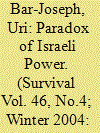

|
|
|
|
|
| Publication |
2004.
|
| Description |
p137-156
|
|
|
|
|
|
|
|
|
|
|
|
|
|
|
|
| 7 |
ID:
149294
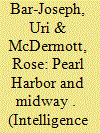

|
|
|
|
|
| Summary/Abstract |
Beginning with the attack on Pearl Harbor, the war in the Pacific was a largely losing campaign for the Americans until the Battle of Midway, on 4–5 June 1942. The American ability to predict this Japanese attack the second time around served as the turning point for the war in the Pacific. And the story of how the Americans turned a catastrophic failure into an impressive cryptological achievement involved the story of one man, Joe Rochefort, convincing another man, Admiral Chester Nimitz who commanded the Pacific Fleet, that he could trust his analysis of the intelligence he compiled and analyzed.
|
|
|
|
|
|
|
|
|
|
|
|
|
|
|
|
| 8 |
ID:
080825
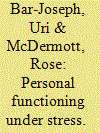

|
|
|
|
|
| Publication |
2008.
|
| Summary/Abstract |
Much work has explored decision making under stress in political leadership. Less work has attempted to link the enormous emotional pressure of crisis with both the heightened sense of political accountability and responsibility and the increased need for social support under such circumstances. The authors examine the impact of political accountability, and the nature and quality of individual social support, on the relative performance of five central Israeli leaders on the second day of the Yom Kippur War. Minister of Defense Moshe Dayan and the Commander of the Southern Command, Maj. Gen. Shmuel Gonen, performed very poorly, whereas Prime Minister Golda Meir and Chief of Staff Lt. Gen. David Elazar performed very well. The Commander of the Northern Command, Maj. Gen. Yitzhak Hofi, performed adequately. The authors account for these divergences in performance based on individual differences in personal accountability and available social support networks.
|
|
|
|
|
|
|
|
|
|
|
|
|
|
|
|
| 9 |
ID:
119433
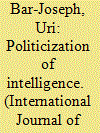

|
|
|
|
|
| Publication |
2013.
|
| Summary/Abstract |
The mistaken October 2002 National Intelligence Estimate of Iraq's weapons of mass destruction (WMD) capabilities, 1 and the claims that it was biased by political pressures, again brought to light the issue of the politicization of analytical intelligence products in democratic states. Top-down politicization is usually defined as "the manipulation of intelligence to reflect policy preferences." 2 More precisely, it is any external intervention in the elements of intelligence work which should be kept objective, autonomous, and free of political influence. Included are three stages of the intelligence process-collection, processing, and production-as well as certain elements of the planning, direction, and dissemination stages, which should be carried out solely on the basis of professional considerations. "External intervention" implies that politicization can be done not only by politicians but also by other consumers of the intelligence product, such as military officers and diplomats.
|
|
|
|
|
|
|
|
|
|
|
|
|
|
|
|
| 10 |
ID:
104245
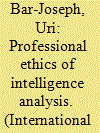

|
|
|
| 11 |
ID:
140495
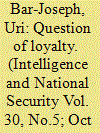

|
|
|
|
|
| Summary/Abstract |
Ashraf Marwan, President Nasser's son-in-law and President Sadat's close aide, was the most important spy in the history of the Arab-Israeli conflict. However, even today, six years after his mysterious murder in London, the question of whether Marwan genuinely worked for the Israeli Mossad or misled it is at the center of a heated debate. Following a brief description of Marwan's espionage career, this article lays out the main arguments advanced by the ‘double-agent’ school, before showing them to be groundless. I conclude that Marwan had genuinely spied for Israel and was, indeed, ‘the best source the Mossad had ever had’.
|
|
|
|
|
|
|
|
|
|
|
|
|
|
|
|
| 12 |
ID:
069399
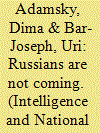

|
|
|
| 13 |
ID:
124748
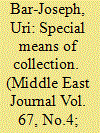

|
|
|
|
|
| Publication |
2013.
|
| Summary/Abstract |
Israeli narratives of the 1973 Arab-Israeli War highlight the army's lack of preparedness in the wake of a successful surprise attack by Egypt and Syria on the Jewish holiday of Yom Kippur, despite assumptions of Israel's intelligence gathering capabilities. Using recently declassified government documents, this article reveals a communication breakdown among Israel's leadership over the operational status of a top secret means of surveillance. This intelligence failure provides the missing link between Israel's wealth of information and the decision to avoid mobilizing the country's reserve army until it was too late.
|
|
|
|
|
|
|
|
|
|
|
|
|
|
|
|
| 14 |
ID:
140165
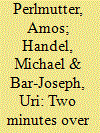

|
|
|
|
|
| Publication |
London, Vallentine, Mitchell and Co. Ltd, 1982.
|
| Description |
191p.hbk
|
| Standard Number |
0853032084
|
|
|
|
|
|
|
|
|
|
|
|
Copies: C:1/I:0,R:0,Q:0
Circulation
| Accession# | Call# | Current Location | Status | Policy | Location |
| 021006 | 956.94052/PER 021006 | Main | On Shelf | General | |
|
|
|
|
|
|
|
|
|